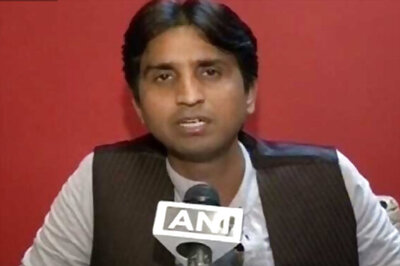
views
Bengali cinema can swing like a pendulum. It can be loud, trashy and terribly Bollywoodish. Or, it can also be subtle, sensitive and sober – much, much like the cinema that Satyajit Ray created. Or Ritwik Ghatak. Indrasis Acharya's latest creation, Parcel -- in Bengali with English subtitles -- which will be part of the competition at the upcoming Kolkata International Film Festival, is undoubtedly closer to Ray than to anybody else.
Acharya's narrative style has a leisurely pace, a pace that reminded me so much about Mahanagar in which a housewife becomes an earner when her husband loses his job. Her new position causes a rift in the family. Nandini (essayed by Rituparna Sengupta) in Parcel also faces traumatic times that have a close bearing to her assignment as a doctor in a hospital. Both women find themselves in a fix – one after she lands a job, and the other after she loses it.
Nandini's husband, Souvik (Saswata Chatterjee), is also a doctor. We all remember the actor who played the cold-blooded murderer in Kahaani, and in Parcel too, he has a dark side to him. A hypocrite to the core, he , despite a seemingly happy marriage, is two timing, and his extramarital relationship is problematic with the woman making unreasonable demands on his time.
Parcel begins beautifully with a violin session in progress. The music (by Joy Sarkar) is certainly joyous, and one of the budding violinists is Nandini-Souvik's little daughter. As the opening credits roll, the music (with piano and flutes) gets supremely divine. A lovely way to introduce us to a plot which runs like an Agatha Christie whodunit.
The notes from the violin and piano fade into what appears like dark clouds on the horizon. A happy birthday bash for Nandini is interrupted by a knock on the door, and a parcel arrives from an unknown, mysterious sender. Both Nandini and Souvik are perplexed; the parcel contains photographs of her in younger days. The couple forget all about the parcel the next morning, but then it is the beginning of a string of parcels, each without a name, but all addressed to Nandini. They all contain her pictures – from the past and some from the present.
Parcel has several layers. It talks about malpractices in the medical field, and how carelessness among doctors and hospitals lead to death and disability. The movie also explores the way fear builds up in Nandini, much like a Christie novel. She is afraid about her past misdemeanour. Will that spoil her relationship with Souvik, and she begins her search to find out who has been her sending parcel after parcel.
Acharya, who has also written the story and the script, takes us slowly into a climax, and it comes as a shock. It is a marvellous, but completely unexpected, closure to this tale of deceit and dishonesty.
The film is imaginatively lit, and the interplay of shadow and light appears to keep pace with the changing moods of the lead characters.The acting is just superb with Sengupta conveying the angst of a woman who feels that she is trapped and may lose just about everything she has created in her marriage. Chatterjee is carefree, callous and a cad, who has little time or patience for his wife, his time and attention often sauntering away towards his work or lover.
Yes, Parcel could have been easily trimmed; there are shots that do not lead anywhere. The two-hour work could have been about 30 minutes shorter. Also, some clarity in a few places could have made the narrative flow a little easy on the viewer.
(Gautaman Bhaskaran is author, commentator and movie critic)




















Comments
0 comment